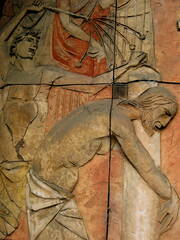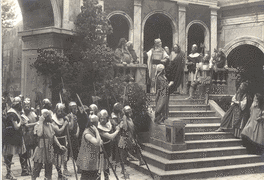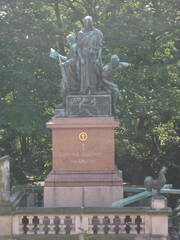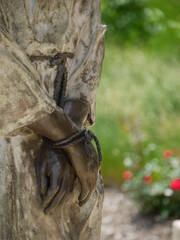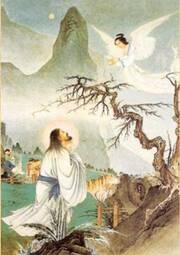First Station of the Cross
Jesus is condemned to death
with Cardinal Joseph Ratzinger 
(Pope Benedict XVI) Good Friday 2005, at the Colosseum in Rome
From the Gospel according to Matthew (27:22-23, 26):
Pilate said to them, “What am I to do with Jesus who is called Christ?” They all said, “Let him be crucified!” “Why?" he asked, "What harm has he done?” But they shouted all the louder, “Let him be crucified!” Then he released Barabbas for them. He ordered Jesus to be first scourged and then handed over to be crucified.
Meditation
The Judge of the world, who will come again one day to judge us all, stands there, annihilated, dishonoured and defenceless before the earthly judge. Pilate is not utterly evil. He knows that this condemned man is innocent; he looks for a way to free him. But his heart is divided. And in the end he lets his own position, his own self-interest, prevail over what is right. Nor are the men who shout out and demand the death of Jesus utterly evil. Many of them, on the day of Pentecost, will feel “cut to the heart” (Acts 2:37), when Peter says to them: “Jesus the Nazarene was a man commended to you by God ... you took and had crucified by men outside the Law” (Acts 2:22.). But at that moment they are influenced by the crowd. They shout because the others are shouting, and as the others are shouting. And in this way, justice is trampled underfoot by weakness, cowardice, for fear of the diktat of the dominant mentality. The quiet voice of conscience is suffocated by the cries of the crowd. Indecision, concern for human respect, give force to evil.
Prayer
Lord, you were condemned to death because fear of the gaze of others suffocated the voice of conscience. It has always been like this throughout history, that the innocent have been maltreated, condemned and killed. How many times have we ourselves preferred success to truth, our reputation to justice? Give force in our lives to the quiet voice of our conscience, to your voice. Look at me as you looked at Peter after his denial. Let your gaze penetrate our hearts and indicate the direction to our lives. To those who on Good Friday had shouted out against you, on the day of Pentecost their hearts were stirred by you and converted. And in this way you gave hope to us all. Give us, ever anew, the grace of conversion.
Our Father .. At the Cross her station keeping, stood the mournful Mother weeping, close to Jesus to the last.
Music: from 'Triduum - Contemporary Sacred Music' by David Bevan & Neil Wright.
To download the free mp3 audio recordings individually, right/double click on the blue play buttons.
Or subscribe to the Via Crucis podcasts in English, French, German, Italian, Portuguese & Spanish on Spotify, iTunes or from Totus2us' RSS feeds.
with Julian of Norwich 
We adore you, O Christ, and we praise you.
Because by your holy cross you have redeemed the world.
Pilate said to him: “Do you not know that I have power to release you and power to crucify you?” Jesus answered: “You would have no power over me unless it had been given you from above.” (John 19:,10)
Then said our good Lord Jesus Christ to me: "Are you well satisfied with my suffering for you?" And I said: "Yes, good Lord, in your mercy. Yes, good Lord, may you be blessed for ever!" Then said Jesus, our kind Lord: "If you are satisfied, I am satisfied. It is a joy, a bliss and an endless delight to me that I suffered my passion for you. And if it were needful or possible that I should suffer more, I would suffer more." (Julian of Norwich - IX Revelation, Ch 22)
I love you Jesus, my love, above all things; I repent with my whole heart for having offended you.
Never permit me to separate myself from you again.
Grant that I may love you always, then do with me as you will.
Our Father ... Hail Mary ... Glory Be.
with Pope St John Paul II in the Jubilee Year
Good Friday, 21 April 2000, at the Colosseum in Rome
also in French, German, Italian, Portuguese & Spanish
“Are you the King of the Jews?” (Jn 18, 33).
“My Kingdom is not of this world; if my Kingdom were of this world, my servants would fight, that I might not be handed over to the Jews; but my Kingdom is not from the world” (Jn 18, 36).
Pilate said to him: “So you are a king?”
Jesus answered: “You say that I am a king. For this I was born, and for this I have come into the world, to bear witness to the truth. Everyone who is of the truth hears my voice.”
Pilate said in answer: “What is truth?”.
At this point, the Roman Procurator saw no need for further questions. He went to the Jews and told them: “I find no crime in him” (cf Jn 18, 37-38).
The tragedy of Pilate is hidden in the question: What is truth?
This was no philosophical question about the nature of truth, but an existential question about his own relationship with truth. It was an attempt to escape from the voice of conscience, which was pressing him to acknowledge the truth and follow it. When someone refuses to be guided by truth he is ultimately ready even to condemn an innocent person to death.
The accusers sense this weakness in Pilate and so do not yield. They relentlessly call for death by crucifixion. Pilate’s attempts at half measures are of no avail. The cruel punishment of scourging inflicted upon the Accused is not enough. When the Procurator brings Jesus, scourged and crowned with thorns, before the crowd, he seems to be looking for words which he thinks might soften the intransigence of the mob.
Pointing to Jesus he says: Ecce homo! Behold the man!
But the answer comes back: “Crucify him, crucify him!”
Pilate then tries to buy time: “Take him yourselves and crucify him, for I find no crime in him” (Jn 19, 5-7).
He is increasingly convinced that the Accused is innocent, but this is not enough for him to decide in his favour.
The accusers use their final argument: “If you release this man, you are no friend of Caesar; everyone who makes himself a king sets himself against Caesar” (Jn 19, 12).
This is clearly a threat. Recognizing the danger, Pilate finally gives in and pronounces the sentence. But not without the contemptuous gesture of washing his hands: “I am innocent of this ... blood; see to it yourselves!” (Mt 27, 24).
Thus was Jesus, the Son of the living God, the Redeemer of the world, condemned to death by crucifixion.
Over the centuries the denial of truth has spawned suffering and death.
It is the innocent who pay the price of human hypocrisy.
Half measures are never enough. Nor is it enough to wash one’s hands.
Responsibility for the blood of the just remains.
This is why Christ prayed so fervently for his disciples in every age:
Father, “sanctify them in the truth; your word is truth” (Jn 17, 17).
Prayer
Lord Jesus Christ, you accepted an unjust judgment.
Grant to us and to all the men and women of our time
the grace to remain faithful to the truth.
Do not allow the weight of responsibility
for the sufferings of the innocent
fall upon us and upon those who come after us.
To you, O Jesus, just Judge,
be honour and glory for ever and ever. Amen.
with Papa San Giovanni Paolo II in 2003
- also in French, German, Italian, Portuguese & Spanish
From the Gospel according to Mark (15: 14-15):
But the crowd shouted all the more, "Crucify him". So Pilate, wishing to satisfy the crowd, released for them Barabbas; and having scourged Jesus, he delivered him to be crucified.
Meditation
Pilate's verdict was pronounced under pressure from the priests and the crowd. The sentence of death by crucifixion was meant to calm their fury and meet their clamorous demand: "Crucify him! Crucify him!" (Mk 15:13-14). The Roman praetor thought he could dissociate himself from the sentence, washing his hands of it, just as he had already distanced himself from Christ's words identifying his Kingdom with the truth, and with witness to the truth (Jn 18:38). In both instances Pilate was trying to preserve his own independence, to remain somehow "uninvolved". So it may have seemed to him, on the surface. But the Cross to which Jesus of Nazareth was condemned (Jn 19:16), like the truth he told about his Kingdom (Jn 18:36-37), had to strike deep into the Roman praetor's soul. All this was, and is, a single reality, in the face of which one cannot remain uninvolved, on the sidelines.
When Jesus, the Son of God, was questioned about his Kingdom and, because of this, was judged guilty by men and condemned to death, his final testimony began: he was about to demonstrate that "God so loved the world..." (cf Jn 3:16).
We have this testimony before us, and we realize that we are not allowed to wash our hands of it.
Acclamation
Jesus of Nazareth, condemned to death on the Cross, faithful witness to the love of the Father.
Kyrie, eleison.
Jesus, Son of God, obedient to the will of the Father, even unto death on a Cross.
Kyrie, eleison.
with St John Henry Newman
V. We adore you, O Christ, and we bless you.
R. Because by your holy Cross you have redeemed the world.
Leaving the House of Caiphas, and dragged before Pilate and Herod, mocked, beaten, and spit upon, His back torn with scourges, His head crowned with thorns, Jesus, who on the last day will judge the world, is Himself condemned by unjust judges to a death of ignominy and torture.
Jesus is condemned to death. His death-warrant is signed, and who signed it but I, when I committed my first mortal sins? My first mortal sins, when I fell away from the state of grace into which Thou didst place me by baptism; these it was that were Thy death-warrant, O Lord. The Innocent suffered for the guilty. Those sins of mine were the voices which cried out, "Let Him be crucified." That willingness and delight of heart with which I committed them was the consent which Pilate gave to this clamorous multitude. And the hardness of heart which followed upon them, my disgust, my despair, my proud impatience, my obstinate resolve to sin on, the love of sin which took possession of me — what were these contrary and impetuous feelings but the blows and the blasphemies with which the fierce soldiers and the populace received Thee, thus carrying out the sentence which Pilate had pronounced?
Pater, Ave, Gloria ...
V. Have mercy on us, O Lord.
R. Have mercy on us.
May the souls of the faithful, through the mercy of God, rest in peace. Amen.
in 2008 with Cardinal Joseph Zen Ze-Kiun SDB
(Bishop of Hong Kong) for the Way of the Cross with Pope Benedict XVI at the Colosseum
- also in French, Italian, Portuguese & Spanish
1st Station - Jesus in agony in the Garden of Olives
V/. Adoramus te, Christe, et benedicimus tibi.
R/. Quia per sanctam crucem tuam redemisti mundum.
From the Gospel according to Mark 14, 32-36
And they went to a place which was called Gethsemane; and Jesus said to his disciples, "Sit here, while I pray." And he took with him Peter and James and John, and began to be greatly distressed and troubled. And he said to them, "My soul is very sorrowful, even to death; remain here, and watch." And going a little farther, he fell on the ground and prayed that, if it were possible, the hour might pass from him. And he said, "Abba, Father, to you all things are possible; remove this cup from me; yet not what I will, but what you will."
MEDITATION
Jesus experienced fear, anguish and sorrow, even to death. He took with him three companions, but soon they fell asleep, and he began to pray alone: "May this hour pass from me, take away this chalice from me.... Yet, Father, may your will be done".
He had come into the world in order to do the Father's will, but never before had he tasted the full depth of the bitterness of sin, or felt so helpless.
In his Letter to the Catholics in China, Benedict XVI recalled the vision in the Apocalypse of St John where the apostle weeps before the sealed book of human history, the "mysterium iniquitatis".
Only the Lamb that was slain is capable of removing the seal. In many parts of the world, the Bride of Christ is undergoing the dark hour of persecution, as Esther once did when threatened by Haman, as did the "Woman" of the Apocalypse when threatened by the dragon. Let us be watchful, and let us accompany the Bride of Christ in our prayer.
PRAYER
Jesus, Almighty God, you chose to become weakness because of our sins, you recognize the cries of the persecuted, which are the echo of your agony. They ask: Why this oppression? Why this humiliation? Why this prolonged servitude?
The words of the Psalm come to mind: "Awake, Lord, why do you sleep? Awake! Do not cast us off for ever! Why do you hide your face, why do you forget our affliction and oppression? For we lie prostrate in the dust, our body cleaves to the ground. Rise up, come to our help!" (Ps 43: 24-26).
No, Lord! You did not have recourse to this Psalm in Gethsemane, but you said: "Your will be done!"
You could have summoned twelve legions of angels, but you did not. Lord, suffering makes us afraid. We are tempted once again to grasp at easy means of success. Help us not to be afraid of fear, help us to trust in you.
Pater Noster ... Stabat mater dolorosa, iuxta crucem lacrimosa, dum pendebat Filius.
